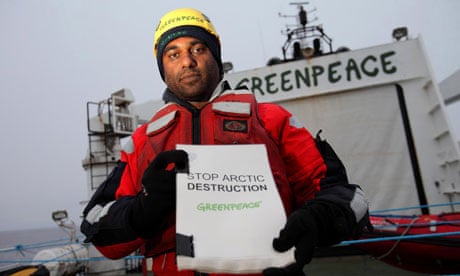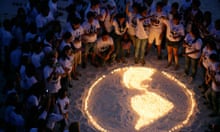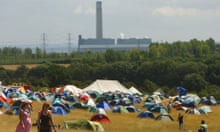It began with a counter-culture movement of young journalists and Canadian ecologists calling themselves the Don't Make a Wave Committee. In one of the last century's more romantic acts, they hired a fishing boat with the modest intention of stopping an atomic bomb test in the Pacific and redefining man's relationship with the Earth.
Forty tumultuous years later, including the sinking of its flagship and the murder of one of its activists by the French government, Greenpeace is a global brand with nearly 3 million members, turning over hundreds of millions of dollars a year and picking fights with almost everyone in power. On Thursday it announced it was planning to expand into developing countries but also warned that the battle against the "mindless exploitation" of Earth's resources was in danger of being lost.
But the group that won't accept donations from corporations and has always offended governments and its proxies is being wished both a happy and a very unhappy middle age. "It was very powerful. It had the passion. It was idealistic and courageous," says Paul Watson, membership no 007 and the youngest surviving co-founder who was expelled in 1977 for being too confrontational. Watson went on to found the rival Sea Shepherd organisation and famously call Greenpeace "the Avon ladies of the environment movement".
"Many of the first group were journalists. We called ourselves [Marshall] McLuhan's warriors. But it's become a big bureaucracy. It's not original any more. It should be concentrating on the issues it began with," said Watson this week.
Rex Weyler, an American-Canadian journalist who sailed on the first boat to the Aleutian Islands, said: "[Greenpeace] adopted a form of civil disobedience - it did for the environment what the civil rights movement did for the dispossessed. We wanted to launch an ecology movement. There were civil rights, women's and peace movements. What was lacking was a real sense of ecology. We set out not to create an international organisation and make Greenpeace famous. We were going to transform the world … it sort of worked, didn't it?".
Former Labour environment minister Michael Meacher said: "My officials were dismayed and business was alarmed, but Greenpeace absolutely captured my imagination by their daring and dangerous escapades. Taking on the big forces of the world in such a scary way struck me rigid. [They] truly brought home what was going on."
Former Conservative environment secretary John Gummer strongly supported the group today. "Every environment minister should thank God for Greenpeace. It has helped us to push the boundaries much further than ever otherwise would have been possible."
But Stewart Brand, author of the 1960s hippy bible the Whole Earth Catalog and now calling himself a "futurist", this week scorned the group he once admired. "They have gone horribly wrong in opposing GM crops and nuclear power. In doing so they are obstructing progress where it is most needed – in the developing world – and making the greenhouse gas situation worse instead of better. In these matters their anti-science stance makes the whole green movement look irrational," he says.
The group has also been attacked by scientists. "Greenpeace is now a ratbag rabble of intellectual cowards intent on peddling an agenda, whatever the scientific evidence. Its former glory rested on the righteousness of its actions in support of real evidence of how humanity was failing to care for the environment. Now it is a sad, dogmatic, reactionary phalanx of anti-science zealots who care not for evidence, but for publicity," said Wilson da Silva, editor of Australian science magazine Cosmos.
But Kumi Naidoo, the South African executive director of Greenpeace International, dismissed the criticism. He said the organisation is in good health, with offices in 40 countries, 3 million members and a growing presence and influence in China, Africa and Latin America. It will shortly launch a new 60-metre flagship Rainbow Warrior, one of the most environmentally advanced ships afloat.
"We've won many historic victories, on nuclear testing, whaling, protecting the rainforests, the hole in the ozone layer, defending the Antarctic and many other issues, the fact remains that the great environmental battle of our age [climate change] is still to be won," he said a statement on Thursday.



